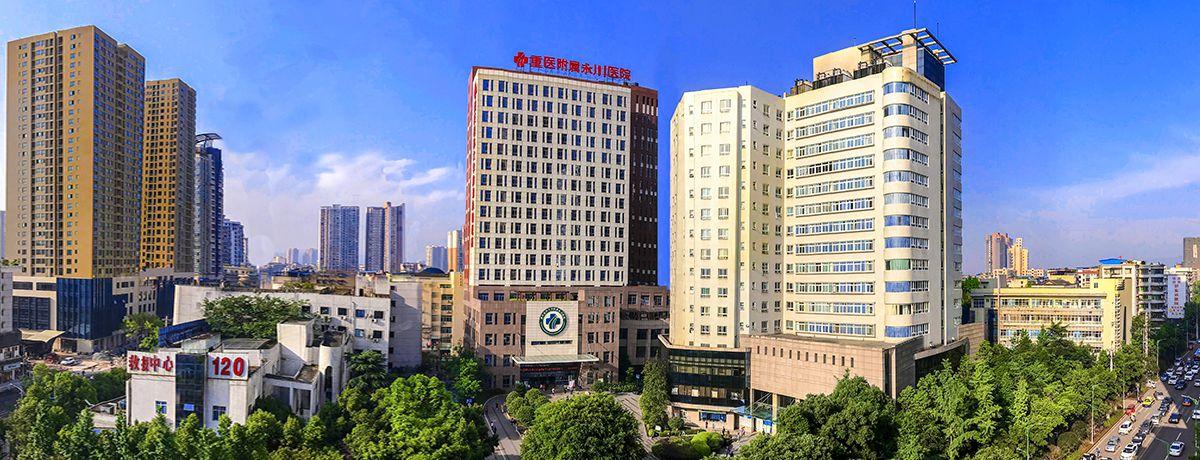
Founded in 1939, Yongchuan Hospital Affiliated to Chongqing Medical University became a national Grade A tertiary hospital in 2008 and was officially affiliated with Chongqing Medical University in 2009. It is a comprehensive institution integrating medical care, education, and research. The hospital currently operates two campuses: the Xuanhua Campus and the Da’an Campus (the Regional Emergency Hospital of Western Chongqing). Over the years, the hospital has earned numerous prestigious accolades, including the Ministry of Health’s “Hospital Reform and Innovation Award,” and titles including “National Demonstration Hospital for Comprehensive Health Management,” “National Model Hospital for Logistics Management Innovation,” and the “Humanistic and Caring Hospital”.
The hospital has 2,377 staff members, including 2,200 professional and technical personnel. Among them, 243 are senior professionals, 563 hold doctoral or master’s degrees, and 378 are full-time faculty members. It boasts 19 provincial and ministerial-level talents, including national reserve talents in the health field and leading medical professionals of the Chongqing municipality, high-end middle-aged and young medical talents, and outstanding youth under the New Chongqing Talent Program. The hospital is home to one provincial key discipline, one provincial key medical discipline, eight provincial key clinical specialties, three provincial key public health specialties, and two provincial characteristic specialties. It houses the regional clinical diagnosis and treatment center for cervical spondylosis and the regional clinical diagnosis and treatment center for cardiovascular diseases (surgery) in Chongqing. Additionally, the hospital operates one municipal quality control center and 20 quality control sub-centers in Western Chongqing.
The hospital continually enhances its medical technology and service quality. It has successfully performed a wide range of advanced procedures, including various cardiac surgeries under extracorporeal circulation, transcatheter aortic valve implantation (TAVI), zero-radiation catheter ablation for atrial fibrillation, percutaneous coronary interventions (PCI), various endovascular treatments for ischemic stroke, interventional embolization and clipping of intracranial aneurysms, neuroendoscopic treatments, transjugular intrahepatic portosystemic shunt (TIPS), bronchoscopic interventional treatments, extracorporeal membrane oxygenation (ECMO), high-intensity focused ultrasound (HIFU) ablation for uterine adenomyosis, and thermal ablation for pulmonary tumors, among other cutting-edge medical technologies. Its floating needle therapy – the technique integrating traditional Chinese and Western medicine, has gained widespread recognition both at home and abroad.
Following the development strategy of “invigorating the hospital through science and education”, Yongchuan Hospital continuously fosters the collaborative growth of medical education, research, and clinical practice. It is home to several multidisciplinary and cross-field research platforms, including a postdoctoral research station in Chongqing, the Clinical Medicine Postdoctoral Research Station of Chongqing Medical University, the Chongqing Clinical Medical Research Center for Geriatric Diseases, and the Chongqing Key Laboratory of Cerebrovascular Disease Research. Over the past five years, the hospital has secured 392 research grants, including funding from the National Natural Science Foundation. As the Fifth Clinical College, the School of General Medicine, and the Yongchuan Branch of the School of Nursing of Chongqing Medical University, the hospital offers programs in clinical medicine (targeted for rural orders), optometry medicine, and nursing (upgrading from associate degree to bachelor's degree). The hospital has a comprehensive educational system encompassing undergraduate, master’s, and doctoral programs, routinely training nearly 1,000 undergraduate students and around 200 full-time master’s and doctoral candidates. In addition, the hospital serves as a standardized training base for resident physicians and clinical pharmacists of the National Health Commission, as well as a standardized training base for nurses in Chongqing. It regularly offers transfer training programs for resident physicians, nurses, and general practitioners, clinical skills training, as well as national and provincial-ministerial continuing medical education programs. The hospital has over 400 trainees of various types.
